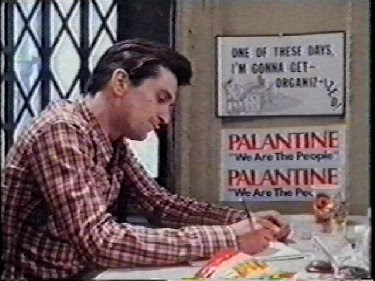When I first saw Taxi Driver years ago, I assumed the last 5 minutes (Travis becomes the hero) was Travis’ fantasy. I saw it again last week, and now I am not so sure. Am I older, dumber, and less imaginative? Maybe I need to get myself organizized? any other takes on this?
The good: He gets to live out his fantasy. The bad: He’s nuts to have that particular fantasy. As my film professor put it, “The theme is that people get the heroes they deserve.”
I was under the impression what we were seeing were actual events. Bickle did go in to rescue Jody Foster. He was nuts to do so, but the result made him a hero.
I can’t remember the movie enough to participate in the thread, I just want to say to Soylent Gene that I did not copy your username (in fact I only noticed it now) and to commend you on your taste in 70’s movies. 
While the people Travis killed weren’t pillars of the community, I can’t see gunning them down as anything but murder. His cause was noble and his targets were deplorable, but not death sentence worthy.
Maybe the john was killed in self defense since he shot Travis first, but Sport and the hotel guy both got shot by Travis first IIRC.
IANAL and all that.
Travis wasn’t just a little nuts, he was a lot nuts, and acted on his fantasies. It was kind of an adolescent hormone induced outburst, except he had a lot of guns.
Just one of the many reasons I consider this classic film to be a failed piece of shit. So much here that doesn’t add up, doesn’t make sense, is not how the world works, is overblown, is silly. If you can’t figure out if the ending is imaginary or real (NOT that there’s a delicious sort of ambiguity, you just can’t make that call), I’ll give you a clue: Scorcese fucked up.
Are you talking to me? Are you talking to me?
I recall discussing some of this stuff in this thread. I still think I’m not “getting” something in Scorsese’s early films.
Just out of curiosity but how old are you? The reason I ask is that there’s a lot in Taxi Driver that probably doesn’t make sense unless you’re aware of what was going on in the 1970s. For example, the seedy, run-down, creepy, crime-ridden, morally-and-financially bankrupt New York depicted in the movie is almost a different planet than the city now.
I’m 58, and was living in Manhattan (and sometimes Brooklyn) all through the 1970s. Try again.
I’ve only seen this movie once, 2-3 years ago, and the ending didn’t strike me as a fantasy sequence at all. I did later read that some people took it that way, but I think it’s better and more interesting if Travis really did manage to become a “hero” despite being psycho and doing things in the wrong way and for the wrong reasons.
Sorry. I wasn’t trying to be insulting. It’s just that on this board you sometimes get people in their teen and twenties who, when they see a old movie for the first time, view it from the perspective of 2011 rather than the year it came out (in this case, 1976).
Anyway, getting back to the OP, I have never thought it was Bickle’s dying dream. The fact Bickle is ultimately considered a “hero” is supposed to an ironic point.
No problem–sorry if I sounded snippy. (And since I did sound snippy, you can take that as an unqualified apology.) You know, Scorcese generally seems to me overrated at this point. I hated New York, New York (totally muddled), was confused by Mean Streets, underwhelmed by Taxi Driver…and reading an account of the filmmakers of the 1970s (sharp, funny book entitled Easy Riders, Raging Bulls, by Peter Biskind), it seems he was on drugs (mainly cocaine), squabbling with his girlfriends, wives and screenwriters the whole time–it was a miracle he could ever make a film that hung together. Raging Bull was uneven, with some great sequences (boxing, for sure, but a lot of Deniro/Moriarty scenes were terrific)–the only really impressive film of his I ever saw was the biopic of Jesus, with Willem Dafoe.
Are you kidding me? Raging Bull is arguably the best film of all time. The cinematography, acting, and emotional impact of the movie are far superior to almost all films. There is not a single flaw in that film.
Isn’t that the one based on Kazantzakis’s novel? Strong source material there.
I saw Taxi Driver when it first aired on HBO in '76 or '77 when I was maybe 10 or 11 years old (parents worked late, was raised by my older brothers & sisters!) Have seen it a few times since, just recently in fact. And neither myself nor any of my bros or sisters nor anyone I’ve ever met has ever even mentioned the idea that the ending is anything but real.
A good (if fleeting) indication of this, and also a great example of 70s films, is after the climax and the reading of the letter by Iris’ dad, when Travis is back driving and standing around with the other cabbies, the black cabbie walks up, smiles, and says to Travis “Yo Killer, you got a fair”. 
Why couldn’t that be part of a fantasy? (nitpick: fare)
It doesn’t really matter if it’s a fantasy or not. The film is full of scenes that may or may not be fantasy - the point is that Travis doesn’t know himself, it’s part of his insanity.
It doesn’t really matter if scenes are fantasies or not. Scorcese’s film career is full of scenes that may or may not be fantasy - the point is that Scorcese doesn’t know himself, it’s part of his incompetence.
